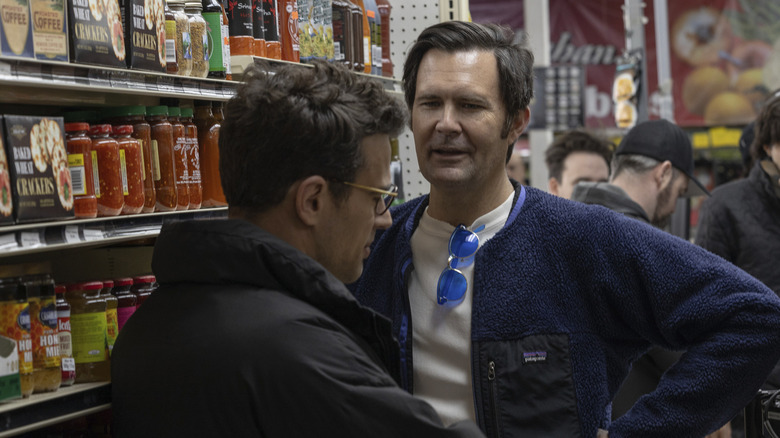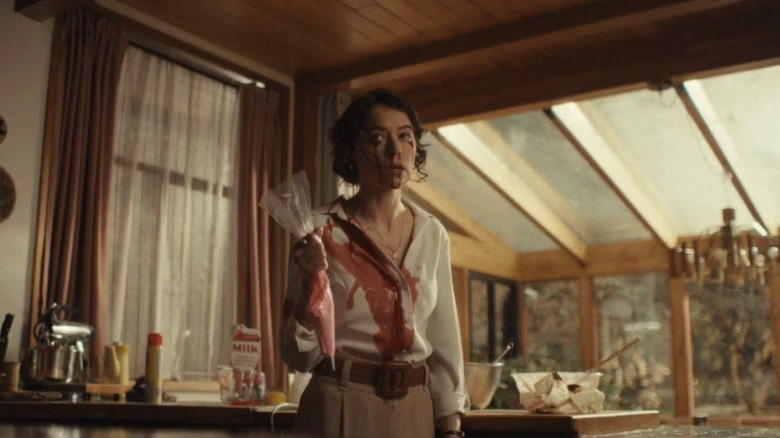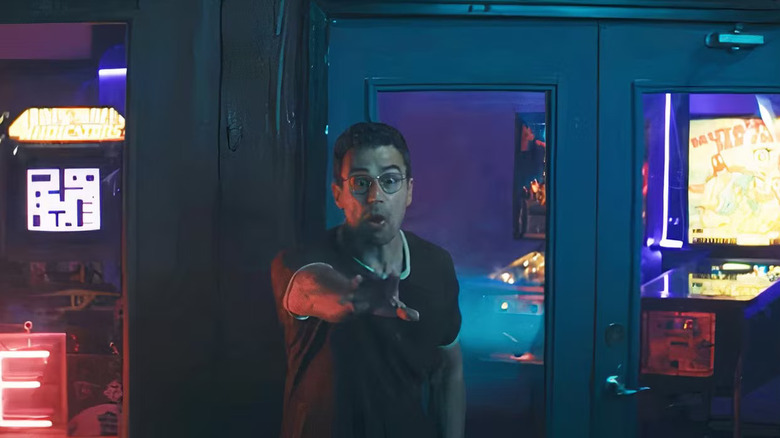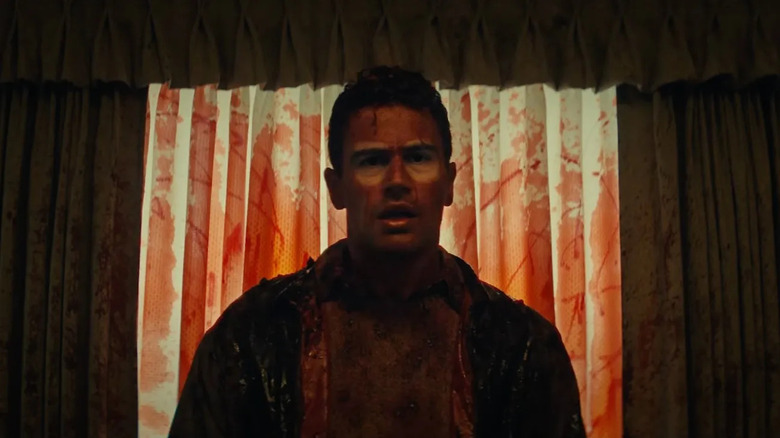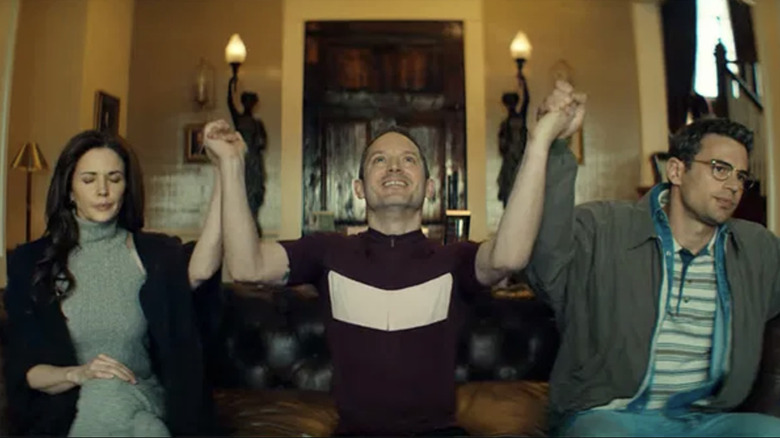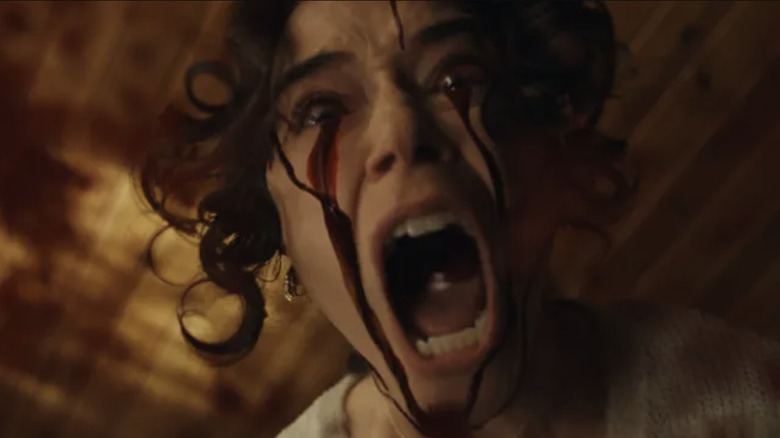The Monkey Director Osgood Perkins Doesn't Think Of The Film As A Horror Movie [Exclusive Interview]
Osgood Perkins may be the most quietly unpredictable Hollywood filmmaker working today. Think about it: Prior to 2024, he was a respected if low-profile indie horror director, making his name with singularly dread-filled, offbeat films like "The Blackcoat's Daughter" and "I Am the Pretty Thing That Lives in the House." Prior to that, he was a character actor, turning up in supporting roles in films as varied as "Legally Blonde," "Secretary," and 2009's "Star Trek." Even the film that was supposed to be his big A24 horror movie debut, 2020's "Gretel & Hansel," got swallowed up by the COVID-19 pandemic, meaning he was still more of an underground favorite by the time his masterpiece, "Longlegs," was ready to debut.
When that movie blew up the box office last year (thanks in large part to a fantastically effective marketing campaign along with a signature performance from star Nicolas Cage), Perkins seemed to have finally arrived. That film felt like a true culmination of the style he'd been perfecting with each of his movies up to that point, and it would've been natural to assume his next movie would follow suit. Which is why "The Monkey" is such a beautifully confounding piece of work — it's a gloriously over-the-top, hyper-violent, intentionally funny pitch-black satire, with very brief flashes of the more deliberate pacing Perkins demonstrated in his prior films. It's a very clever, very canny pivot from the director, one which shows his considerable range even (or perhaps especially) if he decides to keep making movies in the horror genre.
"The Monkey" is far from a breezy romp, however; it deals with themes and ideas just as heavy as Perkins' prior films, and was constructed with as much care. I recently had the opportunity to speak with Perkins about the film, his artistic style, his thoughts on combining comedy and horror, and more. Along the way, he revealed some sneaky Stephen King references which may or may not have ended up in the final film, as well as some hints to his next feature, "Keeper," which promises to keep the Oz Perkins parade of surprises running well into 2025.
Note: This interview has been lightly edited for clarity and brevity.
Oz Perkins on the power of the subconscious and making The Monkey funny
Your movies up to this point have such a power over me when I watch them in terms of making me feel like I'm trapped in a nightmare I can't wake up from. Watching "The Monkey" and then describing it to friends of mine, I realize, "Oh, this sounds like I'm describing a weird dream that I had." Do dreams inspire you at all in your work? Do you have a vested interest in trying to translate that experience to the screen, or is it just a byproduct of your work?
It's occurred to me the more interviews that I give, how much what I do comes from an unconscious place. Usually what I'm generating is coming from stuff that I've absorbed and forgotten, or absorbed and has sort of gone down into the sediment enough that now it's not conscious anymore. And stuff will come out, especially in the course of writing something like this movie, where once I kind of absorbed the short story, I never really looked at it again. And then I was surprised after I wrote it and made the movie to look back at Stephen King's book "On Writing," and realize how much of that, which I had read years ago, I had used in the movie. The relationship with the babysitter, the stuff with the parents — a lot of the stuff was taken from that and I'd totally forgotten about all of it.
So I don't know that necessarily dreams ... I'm not someone who wakes up and writes their dreams down and then uses those things. But I do think that the unconscious is working in my favor. I've managed to kind of connect to it in the process where I don't even really know that it's happening, which I guess makes sense because it's the unconscious.
But was it something conscious on your part, or is it more unconscious in terms of switching up your style on this film?
I think it's really just a matter of doing the thing that is required, right? And so if you look at everything that you create as an assignment, either it's from a boss, or it's from your spirit, or it's from some idea that you had, or it's from the muse or the source or whatever you want to call it. You're being given this assignment to sort of honor this thing that exists whether you want it to or not, or exists in sort of — whether you're going to do it or not, it's out there. And it's my job to find it and put it into its place, or give it form, give it shape, and then give it away.
So with this, the confluence of things, it's like, "Well, I'm given the opportunity to do a Stephen King thing. Oh, it's 'The Monkey.'" The toy monkey is just like this thing that everybody, whether they could verbalize it or not, there's a thing about looking at a toy monkey like that, which is an uncanny thing where you're revulsed, but you think it's sort of cute and sort of funny and sort of playful, but it's awful. There's this weird relationship with it. But I knew that everybody had a thing about it, so I knew the poster was going to be the monkey. It just had to be, what else is it going to be? It's like the f—ing monkey. It's the title, it's the thing.
And then you see the smile on it and you're like, well, you could kind of go the obvious way with it and make it an evil smile that's dark. Or you could go for the leer and feel like there's sort of a cheekiness to it. There's a surreal kind of cheekiness to this. So it just sort of evolved that I didn't see myself trying to make a serious possessed toy movie. And also just the fact that it was going to be about a meditation on death felt like a bummer. If you're going to do a downer about that, you might as well give an uplift. It's a pretty tricky conversation topic for most people, so you might as well pitch it with a smile.
'Horror-comedy is maybe just as hard as anything else'
Obviously the comedy-horror hybrid movie has been around for ages and ages, and yet it's still something that seems to trip people up when they talk about it or when they're trying to define it. I know some people think that it makes the comedy not as funny or it makes the horror not as scary. Now that you've made a variety of horror films in your career and then this one is so intentionally funny, what's your view on comedy-horror? Do you think it's a viable hybrid?
I think you're right to say that it's a tough one, but kind of everything is a tough one. There's no center of the bullseye where it's like, "Well, if I just write a romantic comedy, it'll be great." Horror-comedy is maybe just as hard as anything else. Maybe the problem sometimes with horror-comedy is the comedy ends up being dumb. And I think what we ended up with here is comedy that's at least intelligent enough. Because my comic sensibility grows out of things like "The Simpsons" where it's like the smartest f—ing comic writers on the block.
Or any Brad Bird thing — like "The Incredibles" is funny to me. "Ratatouille" is really funny to me. That kind of deadpan intelligent humor we were able to get, as opposed to something sort of sophomoric and kind of cheap, which I think sometimes gets resorted to in the horror-comedy space. But I kind of abandoned the horror element of it. I guess I don't really think of this movie as a horror movie. I know that it's going to be classified as one, but to me, it's just too absurd for that and gives too much of a good feeling, ultimately, to be just a straight horror movie.
Accomplishing the kills in The Monkey and hidden Stephen King references
Speaking of the absurdism of the movie, those kills are some of the best I've seen in a long while in terms of just insanity. Did you ever go too far? Was there something that got out of your control that you had to abandon or cut in terms of the kill sequences?
Only the occasional thing that was just, practically, we couldn't kind of wrap our heads around it. But by the time we got to the shooting script, everything that was in the shooting script, we accomplished. I mean, there was nothing that kind of got the better of us and we ended up adding some stuff even because we felt kind of good about ourselves and we had a good rhythm going. So some things were actually put in later when we wanted to kind of goose the levels that we all had. But no, nothing was beyond us. When you're making a movie with people who are capable and fun and creative and young and spirited and willing to have a good time, you can really kind of do anything.
I've been lucky enough to see it twice now, both times with an audience, and it's great when the Annie Wilkes name-drop happens. You have that tittering throughout the audience of, "What? Who was that?" Were there other King references that you threaded through that people haven't found yet?
There were a couple that didn't make it into the cut. I can't remember exactly what the graffiti in the prison cell is in "Shawshank Redemption." Someone was here. I can't remember the wording, but we had that on a set. We didn't use the shot that had it in it. The only other one that comes to my mind is the name of the teacher in the sex ed class is Mrs. Torrence.
Making stylistic choices and working with fake twins
Beautiful. Another element that I really like is, I don't know how to describe it exactly, but it's like these little analog, almost VHS cutaway flashbacks for when Ricky is having flashes of his father. And of course there's all those aspect ratio changes during "Longlegs." When you're making stylistic choices like that, are those from a script level or is that something you're finding during production or even post-production?
"Longlegs" was on a script level. When it came to "The Monkey," "The Monkey" was all sort of one format, and then we decided to add in that memory of his dad. It just felt — when you're making a movie and you're being given the trust to kind of do your thing, you want to do your thing. So you want to do what you like. And so if you see something you like, go get it and use it and do it. And that was what it was in "Longlegs." Like Andrés [Arochi Tinajero], the DP and I, we wanted to shoot some VHS, so we shot some VHS. Then in terms of this, I just wanted to enrich the texture a little bit and yeah, you do what feels right. Sort of a weak thing to say, but it makes sense to me.
I think one of the coolest aspects of the movie that's maybe unsung because there's so much going on in it and the kills take center stage, is the way that you're pretty seamlessly integrating Theo James and Christian Convery as twin characters. Production-wise, how complicated was it? Was it a smooth process, or was it, "Oh gosh, we have to remember this person's here," with all the continuity and that sort of thing?
When it came to Christian, we did think ... they were together in [all] those scenes, right? Bill and Hal ended up being together only once, so we did that last. Adult Bill and Hal ended up being together only in the finale scene, which we did very last. So by that time, we were kind of good at everything and we knew how to do the thing, and we knew how to lock off the shot in a certain way. We knew how to get the plates correct, and we knew how to get the thing lined up with the thing, get the handshake and all that.
But when it came to doing it with Christian playing them as kids, you do it the f—ing hard way. You got Christian dressed as one kid and you have his double dressed as another kid, and you shoot that side, you lock it off, you wait, he changes. You come back, you shoot the other side, you do that, you change them, you switch them back, you wait, you shoot the other side. And all the time you're looking at your watch and you're like, "Well, that's taken a long time." But it works.
Keeper is going to be an intimate, 'insidious' movie
I am so looking forward to "Keeper" coming later this year because I don't know what to expect from you next now. Is there anything, hint-wise, you might be able to drop in terms of where you're going?
I would say that "Keeper" is sort of the intimate one, right? "Keeper" is sort of — it's more or less a two-hander. It's more or less Tatiana Maslany and Rossif Sutherland in a relationship, and it takes place more or less entirely in a house on a property, so it has that sort of "in a house" horror trope leading it. But you can probably guess it's not exactly like one that you've seen.
I suppose it's more subtle, I guess, than the previous two pictures. You couldn't get a lot less subtle than "Longlegs," right? I mean, "Longlegs" is about as unsubtle as anything could possibly be. And "The Monkey" is kind of just that, squared. So maybe for "Keeper," you can think of things as being dialed back to be just a little bit more sort of insidious. How about that?
Lovely.
Not like the movie "Insidious," but the descriptor, insidious.
The word. It's a word first!
Right. It's a word. It's still an adjective.
*****
"The Monkey" is in theaters now.
